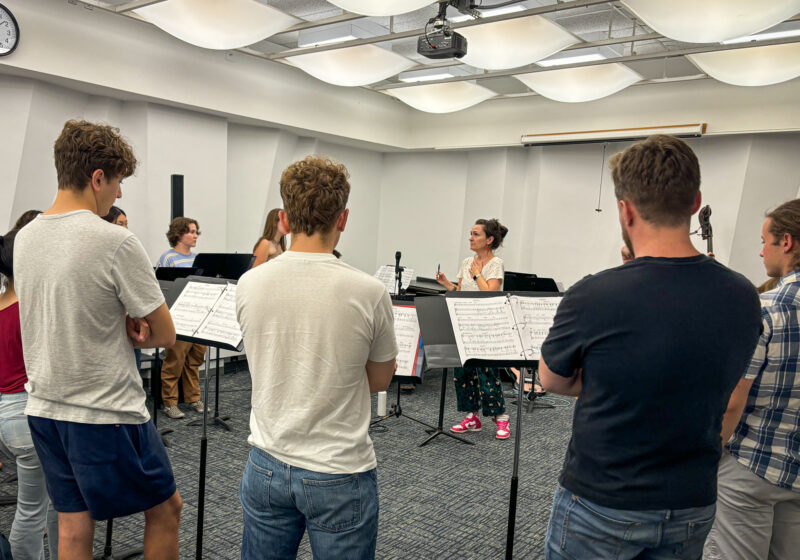Helen Thomas, United Press International’s White House correspondent for more than 50 years, spoke Tuesday night to a full crowd in Hubbell Auditorium as the keynote speaker of Women’s History Month. Her message to the audience, which incorporated the women’s right movement, the civil rights movement, the Iraq War and the War on Terror, was that passivity prevents progress.
Thomas began by addressing the progress women have made since she first started working at the White House. At the time, she was not allowed to join certain press groups because she was a woman and did not receive the same respect that men did at press conferences.
“[Women’s rights] really didn’t need to happen. It should have been included in the Constitution,” Thomas said. “The Founding Fathers really missed that one.”
Women’s rights advanced, Thomas noted, because people dedicated themselves to the cause and persevered, such as when they resisted feeding tubes during a hunger strike or chained themselves around the White House.
Thomas then compared the women’s rights movement to the civil rights movement, as both women and blacks “suffered for rights they should have always had.” Citing a Holocaust survivor who spoke at the 1963 March on Washington, where Martin Luther King, Jr. delivered his “I Have a Dream” speech, Thomas reminded the audience that the silence of the masses had hindered change, but when people worked for change it happened.
Thomas’s tone became more somber as she introduced the Iraq War and its consequences. “I always cut to the chase,” she said. “We are in an illegal war in Iraq.”
At a time when 48 million Americans have no health insurance, children go to school hungry and our education system needs repairs, Thomas noted that the government has spent the Treasury on the Iraq War, which has inflamed the region.
“Every American should ask, ‘What did [the Iraqis] do to deserve this?'”
Thomas then shifted her focus to the War on Terror, where she saw national ambivalence to have allowed the government’s abuses. She asserted that contemporary society’s passivity, in contrast to that of past eras, has allowed the government to wiretap phones, open people’s mail, subject humans to degrading treatment at Abu Ghraib and Guantanamo Bay and revoke habeas corpus.
“Who are we? Why have we allowed our rights to be chipped away in the name of fear?” she asked. “When do the Americans get mad?”
Directly responsible for allowing these abuses to remain unchallenged, Thomas said, was a press that complied with the government and has not fulfilled its duty to the people: to ask difficult questions of the government’s action. Thomas noted that the press became increasingly timid in its questions at White House press conferences since September 11, 2001.
“When reporters don’t ask key questions, they don’t get asked,” Thomas said. “We are the only ones in society who can ask the president these questions on a regular basis.”
Thomas then “lightened up,” as she put it, and recounted notable experiences during her more than 50-year tenure in the White House. She arrived in Washington, D.C. to pursue a career as a journalist and she got her big break as a copy girl. Her salary, $70.50 per week, was “the same as now,” she joked.
As the UPI White House correspondent who covered every president since Kennedy, Thomas learned much about the presidents and had many stories to tell. She found JFK the “most inspiring” and LBJ “bigger than life.”
Nixon, she noted, “Always had two roads to go, but always took the wrong road.” She added, however, that Nixon was the most politically astute president she covered and that he would have been able to predict the 2008 Presidential Election, including who would win each state.
One of her most humorous confrontations with a president, Thomas recounted, was at a press conference where Reagan was “really sweating” answering questions about a potential invasion of Nicaragua. Reagan looked at his clock and then at Thomas, who signaled to him that he had five more minutes until she would ask the closing question.
“It was nice to be able to give orders to the president,” Thomas recalled.
To conclude her speech, Thomas reiterated that Iraq was “the worst war in our history” because the government did not summon soldiers to protect America, but to kill Iraqis, and because our citizens’, politicians’ and press’s complicity allowed it to happen.
This national tepidity, which Thomas repudiated, embodied her message for the evening: changes, whether for women’s rights, for civil rights or in government policy, have never affected themselves; people affected those changes.
“Ask not for whom the bell tolls. It tolls for you,” Thomas said.
Fleming is a member of the class of 2010.




